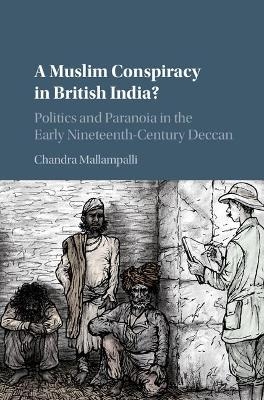
A Muslim Conspiracy in British India?
Politics and Paranoia in the Early Nineteenth-Century Deccan
Seiten
2017
Cambridge University Press (Verlag)
978-1-107-19625-4 (ISBN)
Cambridge University Press (Verlag)
978-1-107-19625-4 (ISBN)
Mallampalli targets those interested in the encounter between the British Empire and Indian Islam. His fresh findings address the history of modern India, British Empire, Muslim reformism, the 'global' and 'local', and conspiracy theories, raising poignant questions about the limits of state power when confronting alleged jihadists.
As the British prepared for war in Afghanistan in 1839, rumors spread of a Muslim conspiracy based in India's Deccan region. Colonial officials were convinced that itinerant preachers of jihad - whom they labelled 'Wahhabis' - were collaborating with Russian and Persian armies, and inspiring Muslim princes to revolt. Officials detained and interrogated Muslim travelers, conducted weapons inspections at princely forts, surveyed mosques, and ultimately annexed territories of the accused. Using untapped archival materials, Chandra Mallampalli describes how local intrigues, often having little to do with 'religion', manufactured belief in a global conspiracy against British rule. By skillfully narrating stories of the alleged conspirators, he shows how fears of the dreaded 'Wahhabi' sometimes prompted colonial authorities to act upon thin evidence, while also inspiring Muslim plots against princes not of their liking. At stake were not only questions about Muslim loyalty, but also the very ideals of a liberal empire.
As the British prepared for war in Afghanistan in 1839, rumors spread of a Muslim conspiracy based in India's Deccan region. Colonial officials were convinced that itinerant preachers of jihad - whom they labelled 'Wahhabis' - were collaborating with Russian and Persian armies, and inspiring Muslim princes to revolt. Officials detained and interrogated Muslim travelers, conducted weapons inspections at princely forts, surveyed mosques, and ultimately annexed territories of the accused. Using untapped archival materials, Chandra Mallampalli describes how local intrigues, often having little to do with 'religion', manufactured belief in a global conspiracy against British rule. By skillfully narrating stories of the alleged conspirators, he shows how fears of the dreaded 'Wahhabi' sometimes prompted colonial authorities to act upon thin evidence, while also inspiring Muslim plots against princes not of their liking. At stake were not only questions about Muslim loyalty, but also the very ideals of a liberal empire.
Chandra Mallampalli is Professor of History at Westmont College, California. He has written extensively on the intersection of religion, law and society in colonial India. His books include Race, Religion and Law in Colonial India (Cambridge, 2011).
Introduction; 1. The fear of itinerant Muslims; 2. Prince Mubariz ud-Daula; 3. A fondness for military display; 4. A diamond in the trough; 5. Slaying men with faces of women; Conclusions.
| Erscheinungsdatum | 22.06.2017 |
|---|---|
| Zusatzinfo | Worked examples or Exercises; 2 Maps; 4 Halftones, black and white |
| Verlagsort | Cambridge |
| Sprache | englisch |
| Maße | 156 x 235 mm |
| Gewicht | 480 g |
| Themenwelt | Geisteswissenschaften ► Geschichte ► Regional- / Ländergeschichte |
| Geschichte ► Teilgebiete der Geschichte ► Wirtschaftsgeschichte | |
| Geisteswissenschaften ► Religion / Theologie ► Islam | |
| Sozialwissenschaften ► Soziologie | |
| ISBN-10 | 1-107-19625-6 / 1107196256 |
| ISBN-13 | 978-1-107-19625-4 / 9781107196254 |
| Zustand | Neuware |
| Haben Sie eine Frage zum Produkt? |
Mehr entdecken
aus dem Bereich
aus dem Bereich
die Ukraine, Polen und der Irrweg in der russischen Geschichte
Buch | Hardcover (2023)
C.H.Beck (Verlag)
28,00 €
eine Globalgeschichte des Kapitalismus
Buch | Hardcover (2023)
C.H.Beck (Verlag)
38,00 €


